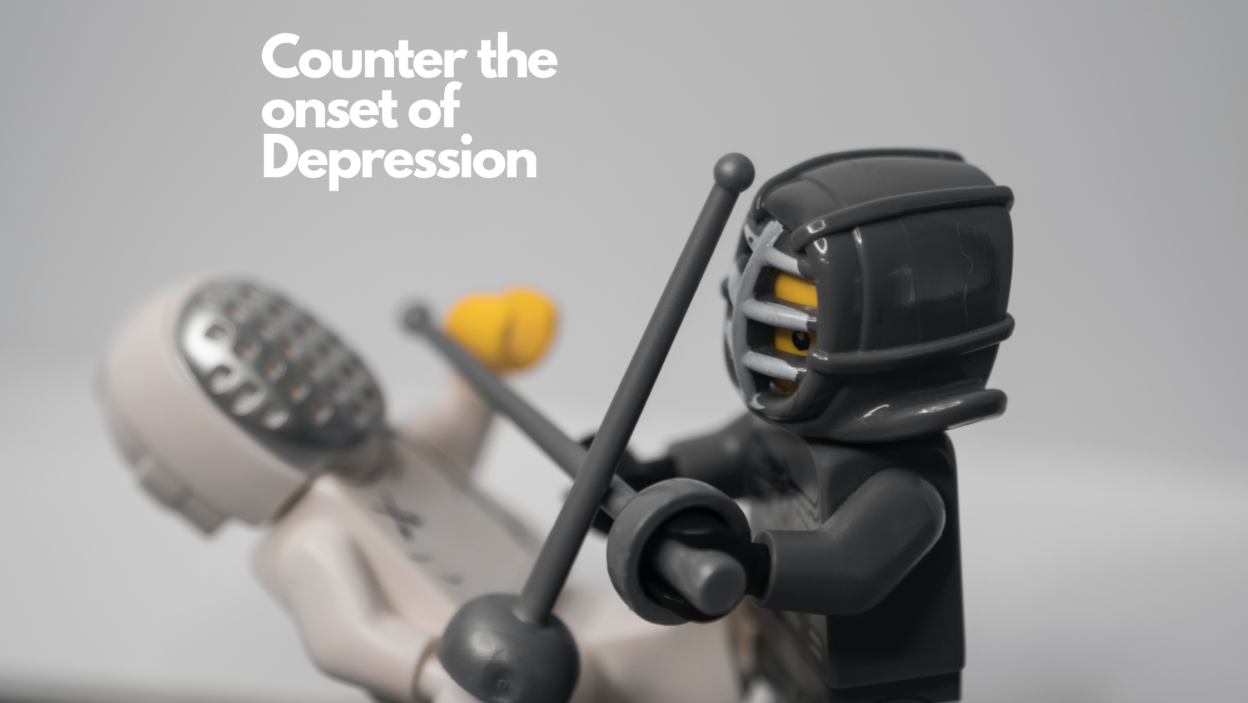Do you sometimes feel an immediate drop in your mood, energy levels, and self-confidence? Trying to do things but unable to even get out of your bed?
What are the outcomes?
Depression cripples your strength, confidence, and motivation, making it tough to accept the measures necessary to improve your mood. At moments, just contemplating the stuff you should be doing to improve your mood, such as exercise or socialising, may seem tiresome or difficult to do.
That’s a Catch-22 situation when it comes to managing or coping with onsets of depression and anxiety attacks. The most beneficial activities are the hardest to do. But there’s also a significant difference between what is difficult and what is impossible. While overcoming depression is neither simple nor fast, you also have more power than you know. The trick is to begin simple and work your way up.
Anxiety is a natural survival mechanism; the body’s instinctive fight-or-flight response is activated when you’re intimidated, under stress, or confronted with a difficult circumstance, as in a new job, test, or first date. Anxiety, in proportion, is not always a terrible thing. However, if anxiety is persistent or overpowering and conflicts with your relations and everyday life, you have most certainly passed the limit towards the anxiety disorder zone.

Coping Mechanisms
If you feel anxious or depressed, try the following:
- Give it a break
Yoga, listening to music, meditating, getting a massage, or learning relaxation methods are all excellent ways to unwind. Removing yourself from the situation helps cleanse your mind.

- Consume nutritious meals
Make certain that you do not miss any meals. Have a supply of healthy, energy-boosting food on standby.
- Reduce alcohol and caffeine uptake
Avoid excessive caffeinated beverages and alcohol, which may exacerbate anxiety and precipitate panic episodes.
- Get adequate sleep
Whenever your body is under stress, it requires extra sleep and relaxation.
- Exercise regularly
Engage in regular physical activity to improve your mood and preserve your health.

- Practice breathing exercises
Slowly and deeply inhale then exhale. You can relax down through breathing exercises. Concentrate just on inhalation and exhalation evenly. It enables you to calm down and refocus your thoughts.
- Start counting to ten, slowly
Repeat this, and then if required, count to twenty.
- Give it your all
Rather than striving for mastery, which is impossible, be proud of your progress.
- Acknowledge your inability to control things
Consider your anxiety in context: Is it truly as terrible as you believe?
- Welcoming laughter
A genuine laugh would keep you happy for longer periods. Look at an amusing video. This strategy may be the simplest. Play clips from your favourite comedian or humorous television show. Laughter is an excellent antidote to anxious thoughts.
- Maintain an optimistic outlook
Make an attempt to substitute good ideas with negative ones.
- Participate
Volunteer or find some other way to get involved in your society that helps build a social network and provides a vacation from daily stress.
- Recognise the sources of your worry
Is it job, family, education, or anything else? While you’re worried or nervous, keep a diary and search for patterns.
- Speak with someone
Inform friends and family members that you are feeling stressed and ask for their assistance. Seek therapy for assistance. You can get professional help and advice from our experts who are here to guide you and even offer the first session at no charge.
- Uphold your current time zone
Anxiety is a future-focused emotion. Therefore, rather than stressing about the future, “pull yourself back from the future” Consider the following: What is going on presently? Am I secure? Is there anything I must do immediately? If not, schedule a “meeting” with yourself afterward in the evening to review your concerns so that those vague possibilities do not derail you.
- Rename what is occurring
Panic episodes often leave you feeling as if you’re about to die or are experiencing a cardiac event. Assure yourself: “I’m experiencing an anxiety attack but it’s safe, brief, and requires no action on my part.” Additionally, take note of the fact that it is just the exact reverse of a warning of imminent death — your body is engaging its fight-or-flight reaction, the mechanism that is responsible for your survival.
- Adhere to the 3-3-3 principle
Take a closer look around your environment and identify three items that you notice. After that, identify three noises you hear. Next, do three movements using three different areas of your body, your ankles, your hands, and your arm. Anytime you find your thoughts racing at a hundred miles per hour, this mental technique may assist in refocusing your attention and drawing you back to reality.
- Simply, act
Standing up, taking a stroll, or removing a piece of garbage from your table, any activity that disrupts your line of thinking helps you recover control.
- Maintain a straight posture
While you are anxious, you bend down to shield your torso – which contains your lungs and heart. Draw your shoulders backwards, stand or sit with the feet apart, and expand your chest as an instant physical alternative to this natural response. This assists your system in regaining power.
The upside of feeling down
Know who you are. Each day is unique when you’ve got this situation. It’s necessary to treat your mental well-being properly and to realise that you will not forever be where you are now.
Whenever you feel the urge to wallow, just do that positively. Repressing your emotional states may appear to be a prudent strategy for coping with depression and anxiety. However, this approach is eventually harmful.
Allow yourself one if you’re experiencing a rough day. Allow yourself to experience feelings but just don’t linger there.
While the COVID-19 epidemic persists, most of us are experiencing social exclusion, loneliness, and lockdowns, which makes it extremely difficult to manage depressive symptoms. Regardless of your situation, there are methods to conquer sorrow and despair, lift your spirits, and reclaim your sense of optimism. Along with the suggestions in this article, you may obtain assistance for depression and anxiety on our website at Conrati.









7 Replies to Counter the onset of depression
Why your child should have a tutor
Mentorship for the Mentee
What is Post-Traumatic Stress Disorder?
Conrati nominated as a Top Environmental Consulting Company by Futurology
How to boost 8 different forms of health
Conrati nominated as a Top Environmental Consulting Company by Futurology
How social media affects mental health
Understanding Bipolar Disorder